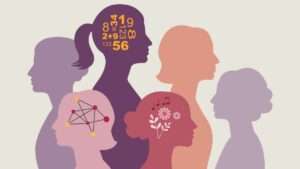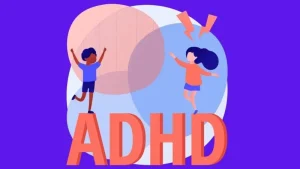Introduction
Signs of ADHD in women is often underdiagnosed due to its subtle and internalized symptoms. Many women go through life struggling with focus, organization, and emotional regulation without realizing that these challenges may be linked to ADHD. Recognizing the signs of ADHD in women can lead to timely diagnosis, effective management, and an improved quality of life. In this post, we explore ten key indicators of ADHD in women, how they present, and their impact on daily life.
If you need professional support, consulting the best psychiatrist in Delhi can provide valuable insights and personalized strategies for ADHD. Consider Visiting:

1. Overlooking Organizational Challenges
One of the most common signs of ADHD in women is chronic difficulty with organization. Simple tasks like managing schedules, maintaining a clean home, or planning meals can feel overwhelming. Unlike occasional forgetfulness, these challenges are persistent and often lead to frustration and guilt. Many women with ADHD struggle with time management, which affects their ability to meet deadlines and complete daily responsibilities. Recognizing these difficulties is the first step toward implementing effective strategies for staying organized.
2. Difficulty Sustaining Focus
Signs of ADHD in women frequently experience challenges with sustaining attention, particularly during tasks that are not immediately engaging. This isn’t just occasional daydreaming—it’s a persistent struggle that interferes with work, personal projects, and even conversations. Many women find themselves jumping from one task to another without finishing them, leading to a cycle of unfinished responsibilities. The inability to maintain focus can sometimes contribute to underachievement, even in those with significant potential.
3. Emotional Sensitivity and Mood Fluctuations
Another significant sign of ADHD in women is heightened emotional sensitivity. Women with ADHD often experience rapid mood swings, feelings of overwhelm, and intense frustration. Unlike the common misconception that ADHD only affects attention and hyperactivity, emotional dysregulation plays a major role in how women experience ADHD. These mood fluctuations can make it difficult to cope with stress, leading to anxiety or depression over time.
4. Struggles with Time Management
Among the most frustrating signs of ADHD in women is difficulty managing time. Many women underestimate how long tasks will take, leading to chronic lateness and missed deadlines. This is not a matter of carelessness but rather an internal sense of time that feels unpredictable. Women with ADHD often feel overwhelmed by time constraints, contributing to increased stress and anxiety. Strategies such as using timers, creating structured routines, and setting reminders can help mitigate these challenges.

5. Hyperfocus on Interests
Interestingly, while focus is a challenge, many women with ADHD experience hyperfocus—an intense absorption in tasks or hobbies that interest them. This can be both a strength and a challenge. While hyperfocus allows women to be highly productive in areas of passion, it can also lead to neglecting other important responsibilities. Learning how to balance hyperfocus with daily obligations is essential for managing ADHD effectively.
6. Social and Interpersonal Challenges
Women with ADHD often struggle with social interactions. They may have difficulty keeping up with conversations, remembering details from past interactions, or maintaining long-term friendships. Additionally, impulsivity can lead to saying things without filtering, which may create misunderstandings. Recognizing these social challenges is essential for improving communication skills and strengthening relationships.
7. Coping with Internal Chaos
A frequently overlooked sign of ADHD in women is the internal chaos many experience. There is often a constant flood of competing thoughts, making decision-making incredibly difficult. Even simple choices, such as what to eat or how to reply to a message, can feel overwhelming. Recognizing this internal struggle can lead to self-compassion and strategies that help simplify daily decisions.
8. Impulsivity and Risk-Taking Behavior
Impulsivity is another common sign of ADHD in women. This can manifest in spontaneous spending, making hasty decisions, or engaging in risky behavior without considering consequences. While impulsivity is often associated with hyperactivity in children, in women, it may appear in more subtle ways, such as difficulty resisting distractions or speaking without thinking. Understanding impulsivity can help in making more mindful choices.
Impact on Self-Esteem and Identity
Many women with ADHD struggle with self-esteem issues. The constant battle with disorganization, emotional dysregulation, and time management can lead to self-doubt. Over time, these challenges may cause women to feel inadequate or incapable. However, recognizing the signs of ADHD in women and understanding that ADHD is only one aspect of their identity—not a reflection of their abilities—can be empowering. Practicing self-compassion and positive self-talk can make a significant difference in building confidence. Identifying the signs of ADHD in women is essential in fostering self-acceptance and implementing strategies for personal growth.
10. When to Seek Support
If you recognize several of these signs of ADHD in women in yourself or someone you know, seeking professional guidance is crucial. A proper evaluation can provide clarity and support. Trusted sources such as the National Institutes of Health (NIH) and the Centers for Disease Control and Prevention (CDC) offer reliable information and resources about ADHD. These organizations can help individuals better understand their symptoms and explore management strategies.

Conclusion
ADHD in women is often overlooked due to its subtle and internalized symptoms. However, the signs of ADHD in women—ranging from difficulty with organization and focus to emotional dysregulation and impulsivity—are significant and deserve attention. Recognizing these signs is the first step toward greater self-awareness, improved coping mechanisms, and a more balanced life. Whether through self-help strategies or seeking professional guidance, understanding ADHD can empower women to turn their challenges into strengths.